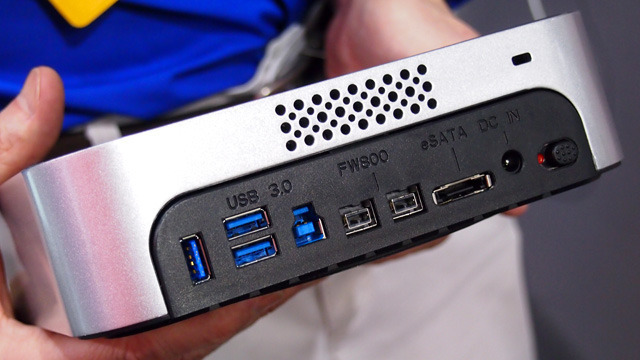
Long-time Mac peripheral and accessory maker Other World Computing made a number of new product announcements throughout the last week at CES. Ars spoke to company representatives on the show floor about several new products, including SSDs for the MacBook Air, a new enterprise class 2.5" SSD drive, as well as new enterprise storage products using mini-SAS (Serial Attached SCSI).
We were also able to sneak a peek at an unannounced PCI Express-based modular SSD for Mac Pros (as well as Windows PCs), and a look at updated Newer Technology miniStacks designed for the latest Mac mini models.
Mini and maxi SSDs
Adding to OWC's line of replacement MacBook Air SSD modules, the company has announced a 480GB version of its Aura Pro Express 6G SSD module for the 2011 MacBook Air. The newest MacBook Air models support SATA speeds up to 6Gbps, though the drives Apple ships only operate at 3Gbps. OWC recently introduced 120GB and 240GB 6G SSD modules for these newer Air models, but we were shown a new 480GB version at CES.
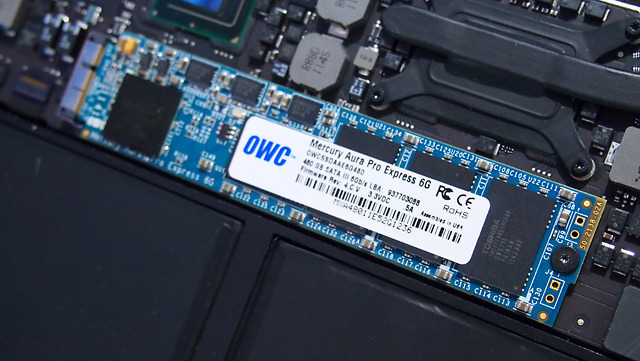
The 480GB Aura Pro Express SSD offers up to 3x the data throughput of stock Apple drives, as well as 8x the capacity of the stock 64GB drive. The 480GB 6G modules should be available in late January (OWC's website currently shows a five-day lead time), but the speed and storage space will cost you: prepare to fork over $1,149. On the other hand, you can't get a MacBook Air SSD with that speed or capacity at any price from Apple or anyone else.
Thankfully, you'll now be able to repurpose the smaller stock SSD module you pull out of your MacBook Air using OWC's Mecury Aura Envoy enclosure. The all-aluminum enclosure is tapered and finished like a MacBook Air, and the preproduction sample we handled was light and slim. To re-use a factory SSD, slide it into the Envoy, close it up with two screws, and hook it up to your MacBook Air via USB. The Envoy supports UBS 3.0, so when Apple updates to the faster standard (likely with the launch of Ivy Bridge Macs) you'll get data speeds as high as 500MB/s.
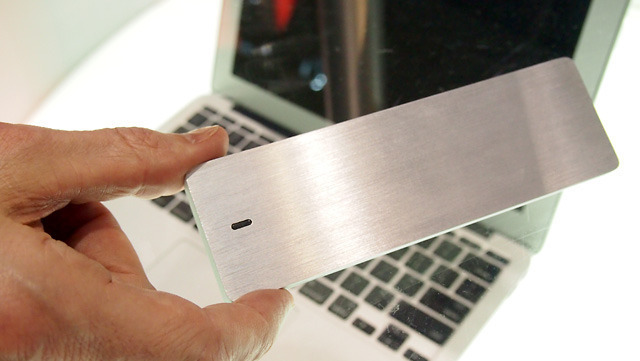
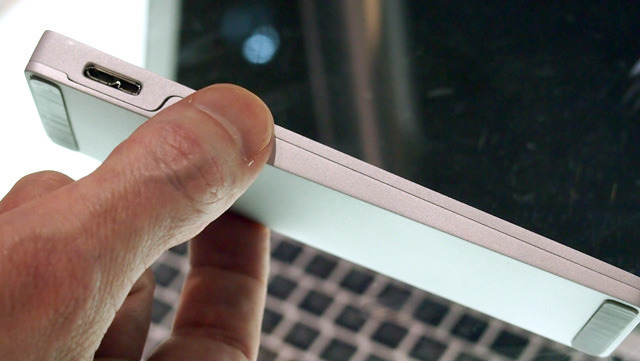
The Mercury Aura Envoy is set to ship in late March for $50. If that's too long to wait, however, OWC is now shipping versions of its Mercury On-The-Go USB 3.0 enclosure and Mecury Elite Pro FW/USB/eSATA enclosure that are compatible with MacBook Air SSD modules for $70 and $110, respectively.
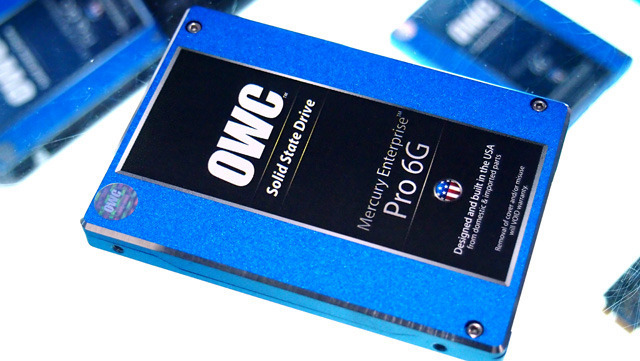
OWC is also launching an enterprise-class version of its Mercury SSDs dubbed Mercury Enterprise Pro 6G. These SSDs use the latest SandForce controllers, as do OWC's other solid state storage. The main differences are the use of Toshiba enterprise-class toggle synchronous 10K NAND chips, which offer 3x the reliability compared to standard MLC NAND; Paratus Power Technology, which uses a small battery backup that enables queued data writes to finish in the case of power loss; and a seven-year warranty, which OWC marketing manager Grant Dahlke claims is the longest in the industry. Essentially, OWC is saying this is as "mission critical" as 2.5" SSDs come.
The Mercury Enterprise Pro 6G line starts at $629 for 50GB and goes up to 400GB for $2,199, and the drives will ship by the end of March.
PCI prototype
Sticking with SSDs for a minute, OWC had on the show floor a prototype of an unannounced PCI Express-based SSD drive. The card is built around a Marvell-based hardware RAID controller connected to four mini-PCI Express slots. The slots can be filled with NAND flash modules similar (though not identical) to those used in the MacBook Air. The slots can be filled with between one and four modules as needed, up to 2TB worth. According to OWC CEO Larry O'Connor, the drive is capable of nearly 2GB/s sustained transfer rates.
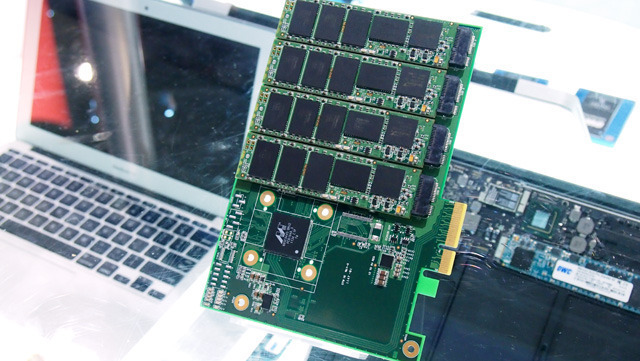
The unnamed SSD is compatible with both Macs and Windows PCs and, according to O'Connor, will be the first PCI Express SSD solution for Mac Pro users. Pricing and availability have not been determined—the card on the CES show floor is one of the first assembled prototypes—but O'Connor told Ars it will most likely launch around the second half of the year.
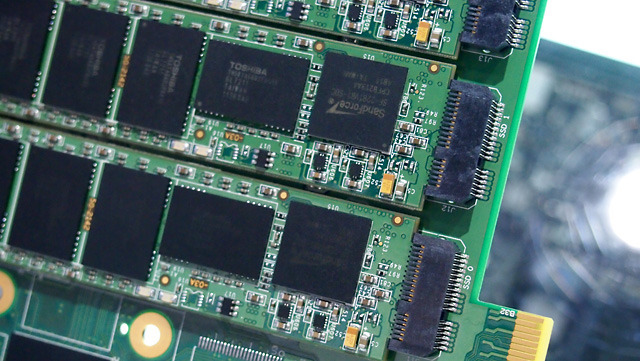
From Mercury to Jupiter
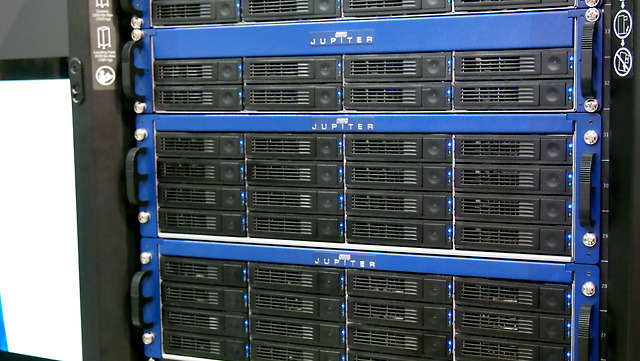
Moving on to more enterprise-class storage options, OWC is launching a new Jupiter line of mini-SAS storage options. The Line will consist of 8- and 16-bay rack enclosures as well as 4- and 8-bay desktop tower enclosures. These can be packed with SAS or SATA drives and configured in RAID 0, 1, 5, 6, 10, 50, 60 and JBOD arrangements. Jupiter connects via mini-SAS in a single or double-wide cable configuration for data throughput rates from 24-48Gbps.
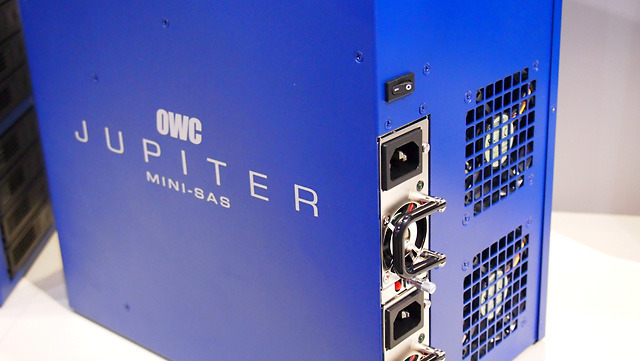
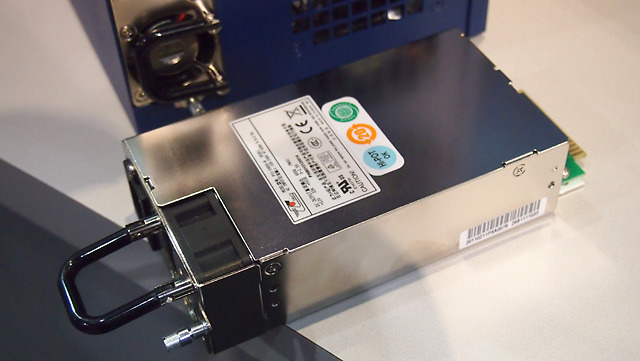
Product development specialist Chris Haeffner explained that the Jupiter drive enclosures can connect directly to a Mac Pro using a mini-SAS PCI Express card. However, the drives can also be connected to an upcoming 9-port hub to create a storage area network (SAN). Effectively any combination of Jupiter RAIDs and Macs can be connected, so you could have two RAIDs shared with up to seven Macs, or just one Mac connected to massive amounts of storage in up to eight Jupiter boxes.
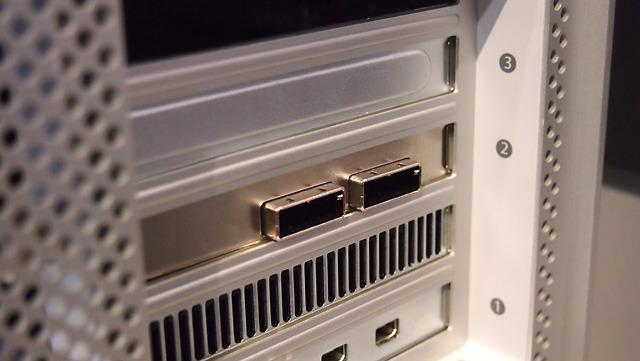
Haeffner also said Jupiter-based SANs can also be expanded further using mini-SAS switches from enterprise storage vendor LSI. While LSI focuses on large enterprise deployments, OWC hopes Jupiter will address the needs of SMBs that have growing high-speed and or high-capacity storage demands.

To that end, OWC will soon offer a Thunderbolt to mini-SAS adapter, allowing iMacs, Mac minis, MacBook Pros, and even MacBook Airs to work with Jupiter storage in either direct or SAN connections.
Also, Jupiter offers significant cost-to-performance benefits over competing solutions, such as Fibre Channel. At 24Gbps throughput, a Jupiter mini-SAS setup offers 3x the performance of 8Gbps Fibre Channel. At the same time, though, it can cost up to 5x less for the infrastructure. For example, four workstations with PCI cards, a 9-port hub, and 10 meters each of active cabling costs around $5,000. The same setup in Fibre Channel would run about $25,000, according to Haeffner.
Mac mini to the max
Finally, OWC will offer some useful new storage options for Mac mini users under its NewerTechnology brand. The company has broken its miniStack storage add-on for Mac minis into two separate offerings. The first is a slim miniStack that is sized to match the latest unibody Mac minis. It features FireWire 800, USB 3.0, and eSATA ports, and a single 3.5" hard disk drive storage option up to 4TB. As its name implies, you can stack your Mac mini on top, connect using FireWire or USB, and you've got instant storage expansion.
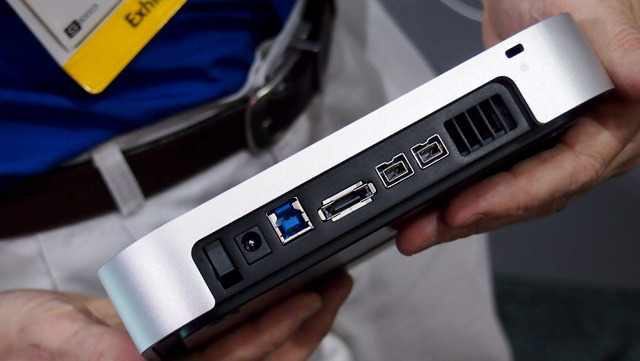
The new miniStack Max, however, kicks the basic miniStack concept into overdrive. This version adds an optical drive—currently a DVD/CD-R SuperDrive, but Blu-ray will be an option soon, a front-facing SD card reader, and a three-port USB 3.0 hub on the rear. We think the miniStack Max—especially with a Blu-ray-compatible optical drive—would make a really good fit for a Mac mini-based HTPC set up.
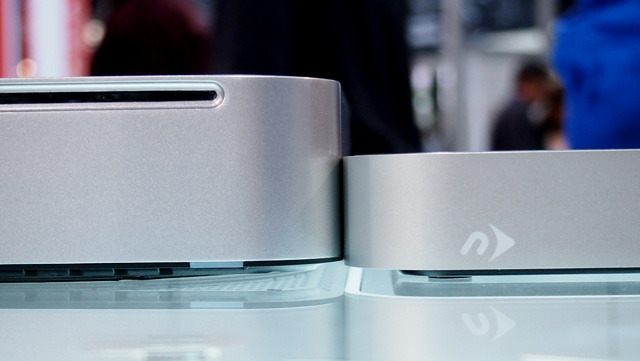
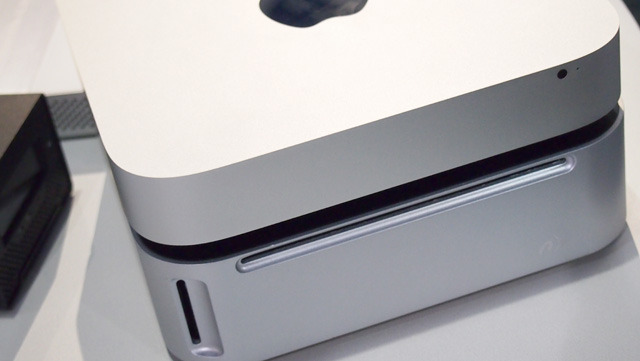
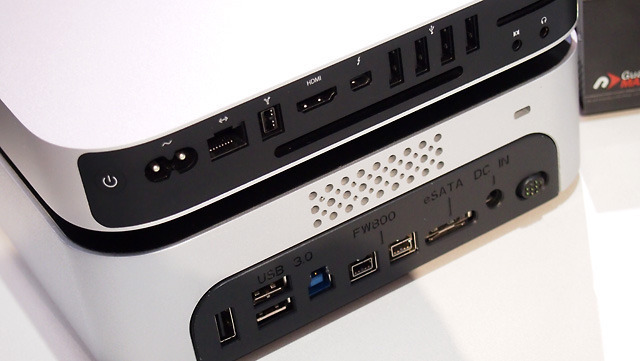
A couple interesting features we noted from our conversation with Dahlke is that one of the USB ports on the rear of the miniStack Max can output a full 10W to fully recharge an iPad. Also, both new miniStacks include USB 3.0 and eSATA ports for future-proofing—as we said, Ivy Bridge-based Macs will very likely support USB 3.0—and wide compatibility with PCs. Though the styling and size are designed to match the Mac mini, a miniStack would be a nice complement to SFF Windows or Linux boxes. Also, Dalke told Ars, we can expect Thunderbolt versions as soon as OWC and NewerTech can get its hands on controllers in volume.
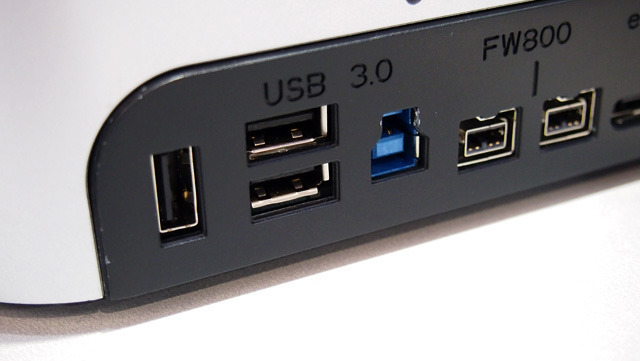
Both new miniStacks should be available at the end of March with pricing to be determined. Users will be able to buy empty enclosures and add their own SATA drive, or order one with 500GB to 4TB preinstalled.
reader comments
49